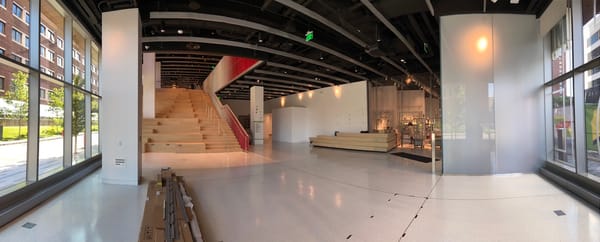Evangelizing Wifi in Austin
I sent a rant to some of my kooky EFF-Austin associates, elaborated a bit, and posted it here on someone else's recommendation.
---
So I consider myself a Wifi evangelist. ("wiff-ee" "Why-Fie" How do YOU say it?)
It's actually a greedy motivation: Converting more wireless enthusiasts=greater demand for wireless in this town. I want more hotspots.
So whenever I can help it, I only schedule meetings at free-hotspot locations...
I take advantage of these opportunities to bring some richness into the conversation (always have pictures and demos and information available to supplement a point).
Sometimes it's a little forced to squeeze in that google search into a tight meeting agenda, but it never fails to leave an impression among the uninitiated, "Gee. You are on the Internet? Do you have to sign up? Is it free? Is it...etc, etc."
I point out that it's relatively painless to get online nowadays.
I also point out that it's a GREAT ROI for these local businesses to host wifi for their customers.
Wifi is good for the community. Period. It helps local businesses compete with national chains. It provides local rally points for ad-hoc convening and collaboration.
So local business owners who are "with it" will soon realize they will lose customers every day they don't have an umbrella.
Then I ALWAYS add a caveat.
Soon... Very soon... There will be a tipping point where wifi will be so ubiquitous that it will no longer be a differentiating factor among cafes and other meeting spots...
I.e. If there are 10 hotspots within two blocks of me, I'll go where there is better food, quieter talking space, cheaper prices, etc.
So the early adopters are going to benefit heavily on this one... Then the business model is going to have to change to account for the public taking for granted their wifi.
I'm not saying this is a bad thing. I think "wireless like water" is exactly where this should end up. I want to take for granted that there will be connectivity at every coffeehouse, bookstore, and park.
I just believe small businesses are going to have to adapt to that situation. Wireless will become a cost of doing business... and somebody will have to figure out a way to compensate the organizations maintaining the hotspots.
I should also note that I would be very willing to pay a $10-20 monthly fee to have access to a Austin-wide wireless umbrella.
However, if a business appeared today, given the current state of coverage, and asked for me to pay for some kind of HotZone pass ("pay us once and have access to multiple hotspots"), I'd say "screw off" and start lamenting VCs and BusinessMen(tm) destroying yet another revolution by trying to profit-take too early.
With apologies to Seth Godin, the IdeaVirus of WiFi is just, barely starting to become an ExperienceVirus... We're not quite at the "don't have to think about it" phase for Average Joe User.
First off, there aren't enough hotspots in convenient locations. The list of publically available hotspots in Austin, for example, could fit on an index card. There are well-trodden parts of town that are disproportionately dark for their population of visitors. (Austin is special, though, and has some very passionate people working on fixing this.)
Worse, the uninitiated do not have enough first hand experience doing connected work outside of the their offices. This is why it's so important for us enthusiasts to take every opportunity to bang the drum and do our demos. Once we have enough connected meetings with non-wifiologists under wifi umbrellas, I think people will begin to expect something different and current from their remote coffeehouse offices ("coffices").
Giving these demos is a perfect example of paradigm violence.
For the time being, there simply isn't enough coverage, yet, to make it worthwhile.
Another problem, which bugs me enormously, begs for a webified experiment (what I wouldn't give for an 8th day in the week) where hotspots are labeled on a map in TERMS OF THEIR COMMUNITY REACH.
I'm calling this a "ReachMap."
Wifi LampLighting Organizations must act in a way that's going to provide a more uniform distribution of hotspots in the area.
I think a ReachMap would look like those Nuke maps that scared me to death in High School Military History class that show who is screwed when the capital is blown up by a 30-megaton weapon... (called Weapons Effect Animated Data Scenario... WEADS... (thanks Don))
Except, instead of the radiation and fire and very bad sunburn, the radius from a hotspot would indicate something like, "If I live on 45th and Lamar, am I within walking distance to a hotspot? Is there an easily reachable bus stop near my home with a less than 10 minute route that takes me to a hotspot?"
There would be true ubiquity when the entire town is painted red in this map.
Right now, East Austin is not very unwired (or wired, for that matter).
With a ReachMap tool, community groups of guerrilla WiFi lamplighters would have a target acquisition system in place rather than a team of volunteers just randomly picking spots. They could automate their deployment schedule so that resource allocation is built from the ground up to create ubiquity, starting with the areas that need it the most!
Check out AustinWirelessCity.org for a starting point.



